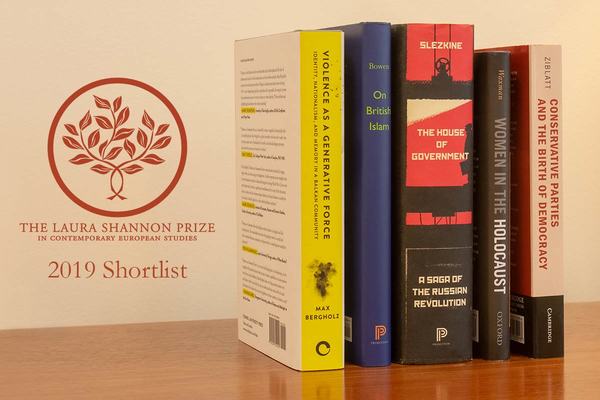
The Nanovic Institute for European Studies at the University of Notre Dame is proud to announce the 2019 shortlist for the Laura Shannon Prize in Contemporary European Studies.
Carrying a prize of $10,000, the Laura Shannon Prize is awarded annually to the author of the best book in European studies that transcends a focus on any one country, state, or people to stimulate new ways of thinking about contemporary Europe as a whole.
The 2019 Laura Shannon Prize will be awarded to the best History and Social Science book published in 2016 and 2017. The winning book is selected by a jury of five eminent scholars in European studies, at least two of whom are prominent scholars serving at institutions other than the University of Notre Dame. The winner will be announced in January 2019.
The five books on the shortlist are included below, accompanied by brief summaries found on the books and publishers’ websites.
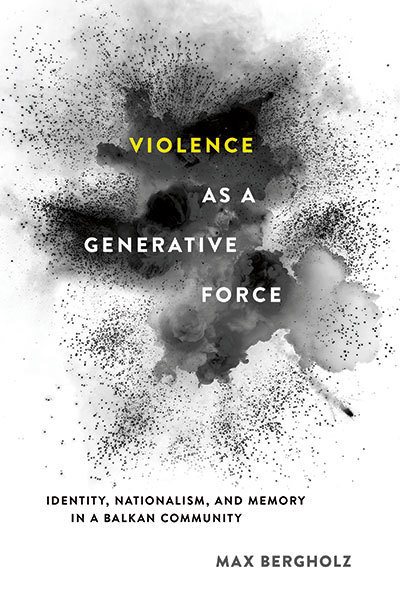
Violence as a Generative Force: Identity, Nationalism, and Memory in a Balkan Community
by Max Bergholz
Cornell University Press
“During two terrifying days and nights in early September 1941, the lives of nearly two thousand men, women, and children were taken savagely by their neighbors in Kulen Vakuf, a small rural community straddling today’s border between northwest Bosnia and Croatia. This frenzy—in which victims were butchered with farm tools, drowned in rivers, and thrown into deep vertical caves—was the culmination of a chain of local massacres that began earlier in the summer. In Violence as a Generative Force, Max Bergholz tells the story of the sudden and perplexing descent of this once peaceful multiethnic community into extreme violence. This deeply researched microhistory provides provocative insights to questions of global significance: What causes intercommunal violence? How does such violence between neighbors affect their identities and relations?
“Contrary to a widely held view that sees nationalism leading to violence, Bergholz reveals how the upheavals wrought by local killing actually created dramatically new perceptions of ethnicity—of oneself, supposed 'brothers,' and those perceived as 'others.' As a consequence, the violence forged new communities, new forms and configurations of power, and new practices of nationalism. The history of this community was marked by an unexpected explosion of locally executed violence by the few, which functioned as a generative force in transforming the identities, relations, and lives of the many. The story of this largely unknown Balkan community in 1941 provides a powerful means through which to rethink fundamental assumptions about the interrelationships among ethnicity, nationalism, and violence, both during World War II and more broadly throughout the world.”
Max Bergholz is Associate Professor of History at Concordia University in Montreal, where he holds the James M. Stanford Professorship in Genocide and Human Rights Studies.
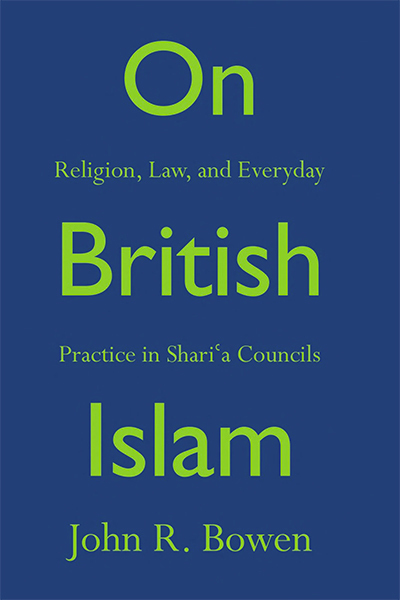
On British Islam: Religion, Law, and Everyday Practice in Shariʿa Councils
by John R. Bowen
Princeton University Press
“On British Islam examines the history and everyday workings of Islamic institutions in Britain, with a focus on shariʿa councils. These councils concern themselves with religious matters, especially divorce. They have a higher profile in Britain than in other Western nations. Why? Taking a historical and ethnographic look at British Islam, John Bowen examines how Muslims have created distinctive religious institutions in Britain and how shariʿa councils interpret and apply Islamic law in a secular British context.
“Bowen focuses on three specific shariʿa councils: the oldest and most developed, in London; a Midlands community led by a Sufi saint and barrister; and a Birmingham-based council in which women play a leading role. Bowen shows that each of these councils represents a prolonged, unique experiment in meeting Muslims' needs in a Western country. He also discusses how the councils have become a flash point in British public debates even as they adapt to the English legal environment.
“On British Islam highlights British Muslims' efforts to create institutions that make sense in both Islamic and British terms. This balancing act is rarely acknowledged in Britain—or elsewhere—but it is urgent that we understand it if we are to build new ways of living together.”
John R. Bowen is the Dunbar-Van Cleve Professor in Arts & Sciences at Washington University in St. Louis.
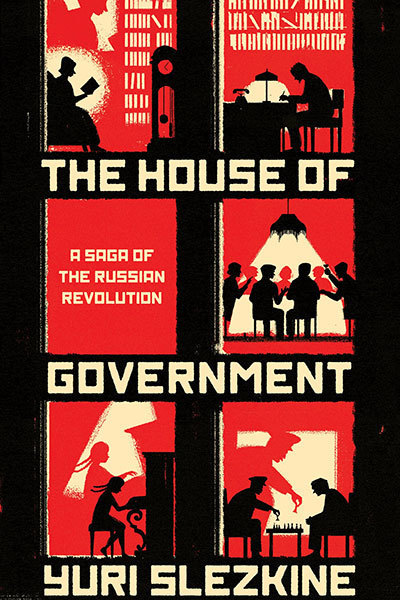
The House of Government: A Saga of the Russian Revolution
by Yuri Slezkine
Princeton University Press
“On the 100th anniversary of the Russian Revolution, the epic story of an enormous apartment building where Communist true believers lived before their destruction
“The House of Government is unlike any other book about the Russian Revolution and the Soviet experiment. Written in the tradition of Tolstoy's War and Peace, Grossman’s Life and Fate, and Solzhenitsyn’s The Gulag Archipelago, Yuri Slezkine’s gripping narrative tells the true story of the residents of an enormous Moscow apartment building where top Communist officials and their families lived before they were destroyed in Stalin’s purges. A vivid account of the personal and public lives of Bolshevik true believers, the book begins with their conversion to Communism and ends with their children’s loss of faith and the fall of the Soviet Union.
“Completed in 1931, the House of Government, later known as the House on the Embankment, was located across the Moscow River from the Kremlin. The largest residential building in Europe, it combined 505 furnished apartments with public spaces that included everything from a movie theater and a library to a tennis court and a shooting range. Slezkine tells the chilling story of how the building’s residents lived in their apartments and ruled the Soviet state until some eight hundred of them were evicted from the House and led, one by one, to prison or their deaths.
“Drawing on letters, diaries, and interviews, and featuring hundreds of rare photographs, The House of Government weaves together biography, literary criticism, architectural history, and fascinating new theories of revolutions, millennial prophecies, and reigns of terror. The result is an unforgettable human saga of a building that, like the Soviet Union itself, became a haunted house, forever disturbed by the ghosts of the disappeared.”
Yuri Slezkine is the Jane K. Sather Professor of History at the University of California, Berkeley.

Women in the Holocaust: A Feminist History
by Zoë Waxman
Oxford University Press
“Despite some pioneering work by scholars, historians still find it hard to listen to the voices of women in the Holocaust.
“Learning more about both the women who survived and who did not survive the Nazi genocide—through the testimony of the women themselves—not only increases our understanding of this terrible period in history, but necessarily makes us rethink our relationship to the gendered nature of knowledge itself. This book is about the ways in which socially and culturally constructed gender roles were placed under extreme pressure; yet also about the fact that gender continued to operate as an important arbiter of experience. Indeed, paradoxically enough, the extreme conditions of the Holocaust—even of the death camps—may have reinforced the importance of gender.
“Whilst men and women for no greater reason than their being Jewish were sentenced to death, gender nevertheless operated as a crucial signifier for survival. Pregnant women as well as women accompanied by young children or those deemed incapable of hard labour were sent straight to the gas chambers. The very qualities which made them women were manipulated and exploited by the Nazis as a source of dehumanization. Moreover, women were less likely to survive the camps even if they were not selected for death. Gender therefore became a matter of life and death.”
Zoë Waxman is Senior Research Fellow at Oxford Centre for Hebrew and Jewish Studies.
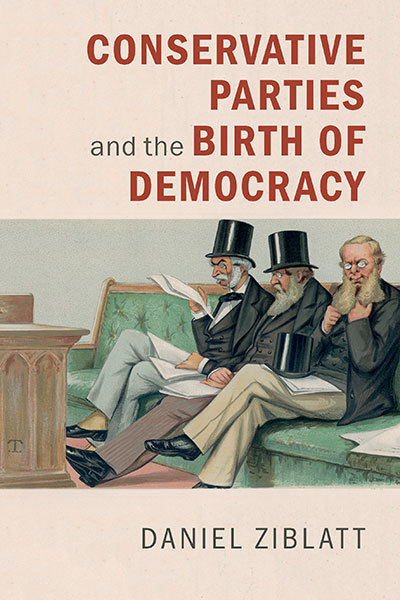
Conservative Parties and the Birth of Democracy
by Daniel Ziblatt
Cambridge University Press
“How do democracies form and what makes them die? Daniel Ziblatt revisits this timely and classic question in a wide-ranging historical narrative that traces the evolution of modern political democracy in Europe from its modest beginnings in 1830s Britain to Adolf Hitler's 1933 seizure of power in Weimar Germany. Based on rich historical and quantitative evidence, the book offers a major reinterpretation of European history and the question of how stable political democracy is achieved. The barriers to inclusive political rule, Ziblatt finds, were not inevitably overcome by unstoppable tides of socioeconomic change, a simple triumph of a growing middle class, or even by working class collective action. Instead, political democracy's fate surprisingly hinged on how conservative political parties – the historical defenders of power, wealth, and privilege – recast themselves and coped with the rise of their own radical right. With striking modern parallels, the book has vital implications for today's new and old democracies under siege.”
Daniel Ziblatt is Professor of Government at Harvard University.
The winner of this year’s Laura Shannon Prize in Contemporary European Studies will accept their prize with a lecture in fall 2019 at the University of Notre Dame.
Nominations for the 2020 Humanities cycle (for books published in 2017 and 2018) are due Thursday, January 31, 2019. For more information on the nomination process, please visit nanovic.nd.edu/prize.